Contents
Market Overview
Macro Review
Chair Powell added another dovish impulse, even if U.S. labor data caused a hiccup into the next FOMC. A moderation in monetary tightening and an acknowledgement of the risks of over-tightening led to an improvement in fixed income sentiment. Equally, a weaker U.S. ISM with a decline in the prices paid (43.0) supported this. A stronger NFP and higher average hourly earnings caused a brief reversal as core rates re-priced wider. This may have reduced the magnitude of Fed cuts in 2023 to 47bp, which admittedly is nothing on the 174bp in Chile, 296bp in Hungary and 47bp in Poland in the next six months alone. We also note that Japan’s 10-year auction was the strongest since 2005, German retail sales disappointed, European inflation all surprised to the downside and the S&P traded above the 200dma as the VIX eventually broke through 20. This was in addition to China’s extended fiscal support and Vice Premier Chunlan noting that the virus had a weakening pathogenicity for the first time. Despite weaker PMIs and paltry 4Q22 growth assumptions, CNH recorded its best monthly gain on record in November (3.96% stronger). However, the largest EM event risk rests with South Africa. Ramaphosa alleged that he had sold 20 buffalo to a Sudanese businessman for an $580k. Unfortunately, no VAT was paid on the proceeds and it was stored in a leather sofa and subsequently stolen. The Phala Phala corruption investigation remains damning and weakened Cyril Ramaphosa’s hand in governing, but he instead sought a legal review of the Section 89 claims. The broader question that investors need to grapple with is whether South Africa is institutionally weaker and whether political paralysis will truly weigh on asset prices. As impeachment and/or resignation risks eased toward the end of the week, the South African ZAR showed signs of rebounding, CDS began to retrace and local bonds recovered almost half of the widening. Finally, the consternation around Brazil’s economic team and Lula’s appointments continued. The other surprise was a collapse in PMIs from 50.8 to 44.3 as confidence in Brazilian assets has shown visible signs of fading.
EM Credit Update
Emerging market sovereign credit (cash bonds) ended the week +1.9% with spreads 15bp tighter. The clear outperformer was Single B corporate credit that rallied 54bp this past week and generated returns of 2.7%, which was the clear winner in EM other than a small handful of distressed sovereigns. The distressed sovereign credits that outperformed over the week were Pakistan, Sri Lanka and Ghana, while Ukraine, Poland and South Africa underperformed. China’s COVID moderation lifted equities and weak U.S. data drove U.S. rates tighter on the whole, which created a positive backdrop for risk sentiment. Colombia was able to issue a $1.36bn 2033 bond, while tendering 2023 and 2024 notes and Turkey tapped its 2028 bonds. Turkey was able to tap a bond 100bp tighter from when it was issued just three weeks earlier. However, half of the tapped amount was taken down by a Middle Eastern “foreign official sector entity”.
The Week Ahead
Other than the FIFA World Cup progressing to the last sixteen, the calendar for the next week is appropriately busy. The EU sanctions on Russian oil are due to take effect on Monday (capped at $60/bbl), but the larger event is with OPEC+ on Sunday. There had been speculation of possible cuts, which have also been rejected by just as many sources. China will publish CPI data along with the Caixin Service PMIs, which come after disappointing NBS PMIs but upbeat Caixin Manufacturing results. Major interest rate decisions are due from the RBA (2.85%), followed by Chile (11.25%), India (5.9%), Kazakhstan (16.0%), Peru (7.25%) and Ukraine (25.0%). The language around the BCCh and easing policy in 2023 could be the main EM market mover. Then Turkish and Russian inflation updates will be watched after Eurozone CPI had already shown strong signs of slowing. The inflation releases out of Brazil and Mexico are already on a moderating path, but the key will be any significant miss that could alter the central banks current projections.
Highlights from emerging markets discussed below: China is facing protests against stringent COVID policies, further setting the stage for gradual adjustment into 2023; South Africa’s President Ramaphosa pressured ahead of ruling party electoral conference later this month; and Saudi FX liquidity injection for Turkey supports “muddle through” scenario until 2023 elections.
Fixed Income
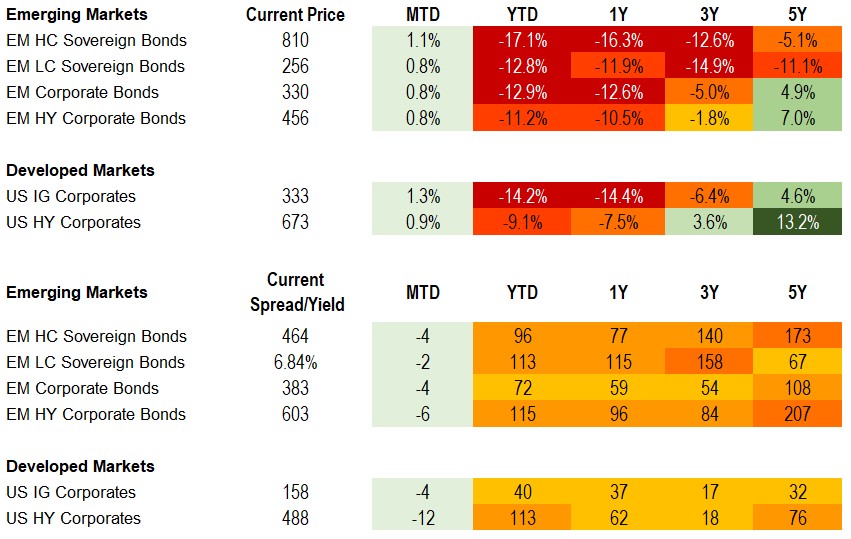
Equities
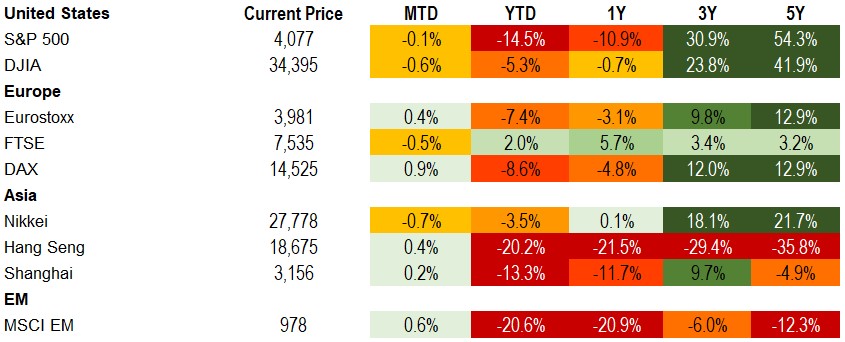
Commodities

Source for data tables: Bloomberg, JPMorgan, Gramercy. EM Fixed Income is represented by the following JPMorgan Indicies: EMBI Global, GBI-EM Global Diversified, CEMBI Broad Diversified and CEMBI Broad High Yield. DM Fixed Income is represented by the JPMorgan JULI Total Return Index and Domestic High Yield Index. Fixed Income, Equity and Commodity data is as of December 2, 2022 (mid-afternoon).
Emerging Markets Weekly Highlights
China is facing protests against stringent COVID policies, further setting the stage for gradual adjustment into 2023
Event: Social unrest broke out last weekend across several cities in China following more lockdowns amid higher cases and a deadly apartment fire where response time was possibly hindered by COVID regulations. The protests have focused on discontent associated with the current restrictions, with a minority calling for Xi’s removal from power. Officials have continued to fine-tune their narrative on zero-COVID policy (ZCP) and tweak associated measures in the aftermath of the Party Congress in October. Meanwhile, November PMI data remained in contractionary territory with softness in new export orders as well as an uptick in delivery times.
Gramercy commentary: In our view, the protests are supportive to gradual ZCP evolution although they are not a game changer on their own. Furthermore, we do not see a material threat to Xi’s consolidated power post Party Congress as authorities’ have largely been able to contain unrest thus far and protests, specifically against Xi, have been limited. In the near-term, we think that the government will continue to prioritize its credibility and challenges to the healthcare system at the national level, keeping conditions relatively tight and promoting vaccination through the winter. At the same time, moderate adjustments to measures should also continue with an emphasis for optimization at the local level. Our base case remains that by spring of 2023, gradual improvement in immunity, social discontent towards ZCP, and strained economic conditions with limitations of effectiveness of additional liquidity measures should drive a more meaningful pivot to a flexible approach.
South Africa’s President Ramaphosa pressured ahead of ruling party electoral conference later this month
Event: The parliamentary inquiry report on allegations of corruption against President Cyril Ramaphosa surprised to the downside with stronger evidence of violations and call for members of parliament to debate Ramaphosa’s impeachment. South African assets sold-off in reaction to the elevated uncertainty. This contrasted to the rest of the asset class which exhibited strength on the back of greater expectations for a decline in the magnitude of Fed rate hikes and China COVID policy evolution.
Gramercy commentary: While the situation is highly uncertain and fluid, we think there is a reasonable probability that Ramaphosa prevails as President of the African National Congress and country, or in the event of his near-term resignation, a market constructive replacement such as current Treasury General, Paul Mashatile (otherwise expected to become Deputy President), takes over through the electoral conference set to begin on December 16th. In both scenarios, we see local assets still being largely anchored by constructive monetary policy and contained fiscal risks albeit with elevated levels of uncertainty around the 2023 policy and reform agenda associated with possible bouts of volatility. At this stage, we think chances of a downside scenario where a market negative candidate emerges out of the electoral conference more meaningfully jeopardizes the South African credit trajectory through fiscal deterioration, derailment of Eskom plans or blockage of FATF legislation are limited.
Saudi FX liquidity injection for Turkey supports “muddle through” scenario until 2023 elections
Event: Saudi Arabia’s ministry of finance confirmed that talks with the authorities in Ankara are in final stages toward depositing $5bn at the Central Bank of Turkey (CBRT).
Gramercy commentary: A fresh inflow of a sizable hard currency liquidity from Saudi Arabia will go a long way in supporting President Erdogan’s strategy to muddle through without triggering a serious economic crisis until crucial presidential and legislative elections, which are expected to be held by June 2023. In this context, we expect distortionary economic policies targeting stronger GDP growth to become even more aggressive in the next few months until elections. Securing ad-hoc financing from external donors such as the Saudi multi-billion deposit at CBRT or rumored deferral of payments for Russian gas imports would be critical for Turkey’s economic outlook and Erdogan’s political prospects in the near term. As a reminder, the CBRT already relies on significant currency swap lines with the other Gulf financial powerhouses Qatar and UAE. Such bi-lateral liquidity arrangements are unlikely to improve anything in Turkey’s distorted macroeconomic framework but will help greatly with plugging the economy’s short-term external funding gap amid relentless growth-promoting policies and a widening current account deficit. Saudi’s financial support for Ankara comes on the heels of a recent constructive meeting between the crown prince Mohamed Bin Salman and President Erdogan that appeared to put the problematic “Khashoggi chapter” behind the two leaders, as well as improve relations between Turkey and Egypt, a key Saudi regional ally. We expect Erdogan’s regional geopolitical “charm offensive” to continue in the pre-election period and help him finance highly expansionary economic policies at home. Recent security developments domestically also are likely to have favorable repercussions for the incumbent president, which helps confirm our view that the odds of Erdogan’s re-election next year are on the rise.
Emerging Markets Technicals
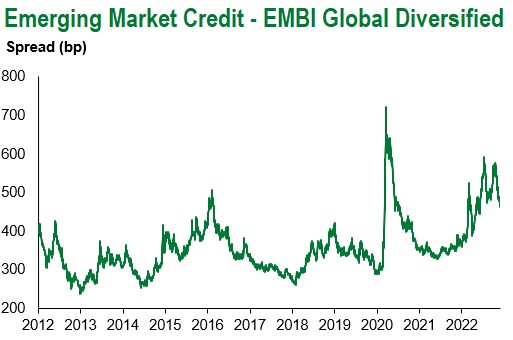
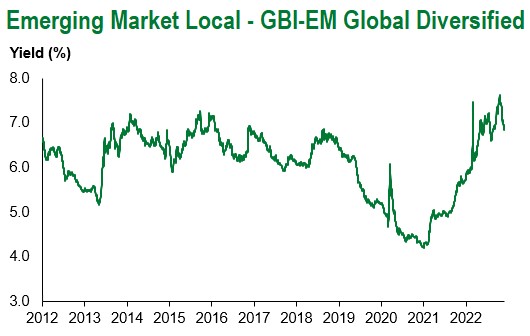
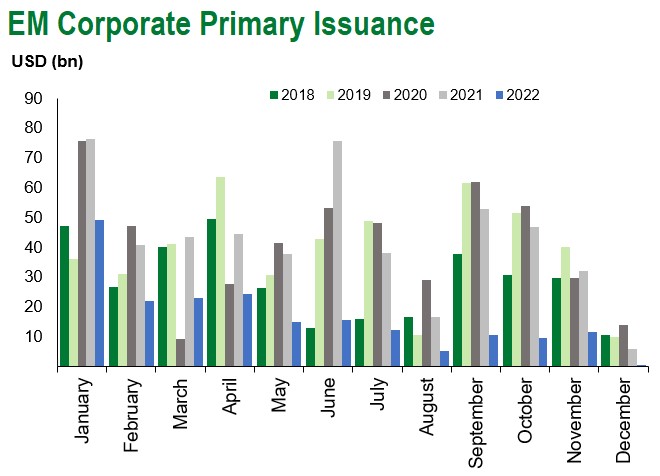
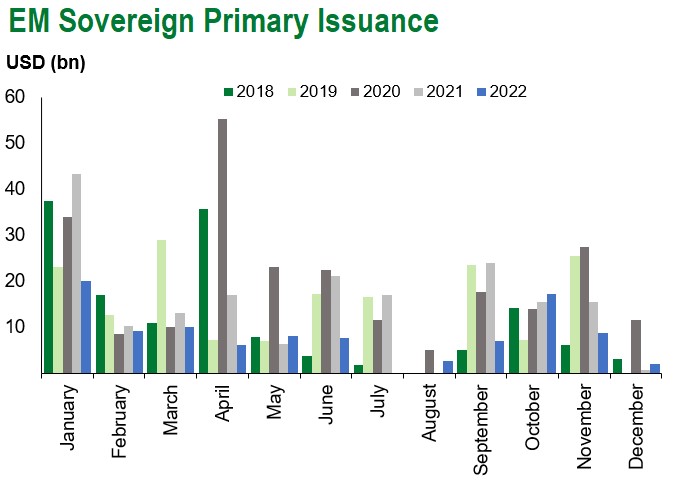
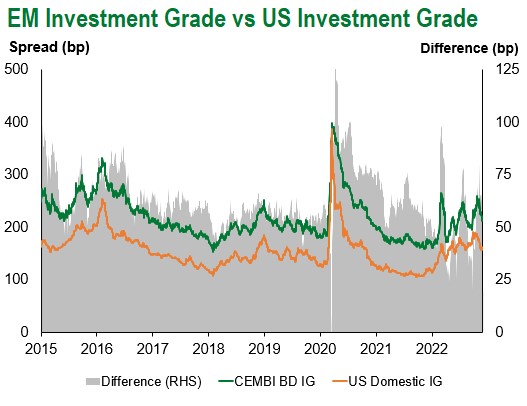
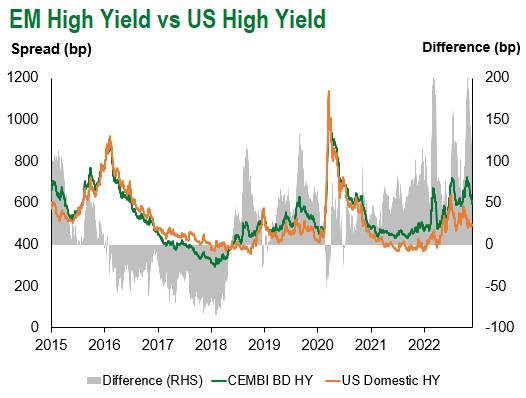
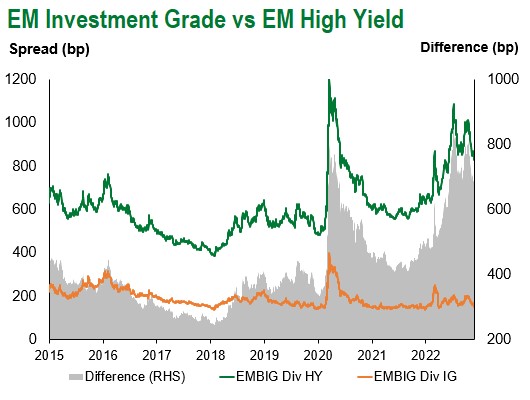
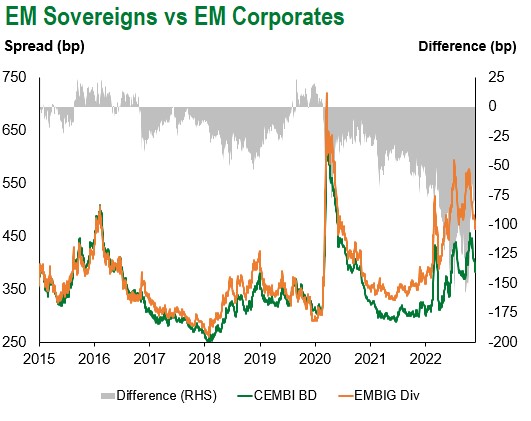
Emerging Markets Flows
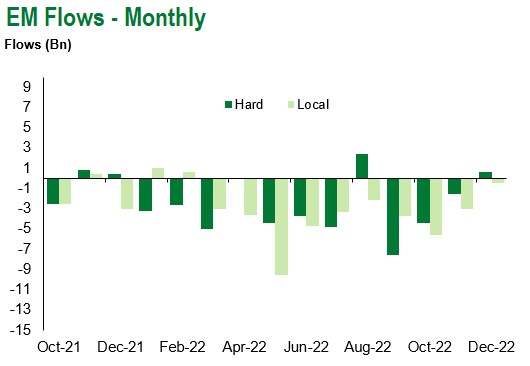
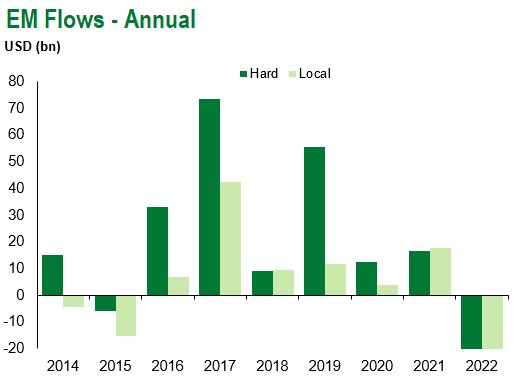
Source for graphs: Bloomberg, JPMorgan, Gramercy. As of December 2, 2022.
COVID Resources:
Johns Hopkins COVID-19 Case Tracker
For questions, please contact:
Kathryn Exum, CFA ESG, Director, Co-Head of Sovereign Research, [email protected]
Petar Atanasov, Director, Co-Head of Sovereign Research, [email protected]
James Barry, Director, Deputy Portfolio Manager, [email protected]
This document is for informational purposes only. The information presented is not intended to be relied upon as a forecast, research or investment advice, and is not a recommendation, offer or solicitation to buy or sell any securities or to adopt any investment strategy. Gramercy may have current investment positions in the securities or sovereigns mentioned above. The information and opinions contained in this paper are as of the date of initial publication, derived from proprietary and nonproprietary sources deemed by Gramercy to be reliable, are not necessarily all-inclusive and are not guaranteed as to accuracy. This paper may contain “forward-looking” information that is not purely historical in nature. Such information may include, among other things, projections and forecasts. There is no guarantee that any forecasts made will come to pass. Reliance upon information in this paper is at the sole discretion of the reader. You should not rely on this presentation as the basis upon which to make an investment decision. Investment involves risk. There can be no assurance that investment objectives will be achieved. Investors must be prepared to bear the risk of a total loss of their investment. These risks are often heightened for investments in emerging/developing markets or smaller capital markets. International investing involves risks, including risks related to foreign currency, limited liquidity, less government regulation, and the possibility of substantial volatility due to adverse political, economic or other developments. References to any indices are for informational and general comparative purposes only. The performance data of various indices mentioned in this update are updated and released on a periodic basis before finalization. The performance data of various indices presented herein was current as of the date of the presentation. Please refer to data returns of the separate indices if you desire additional or updated information. Indices are unmanaged, and their performance results do not reflect the impact of fees, expenses, or taxes that may be incurred through an investment with Gramercy. Returns for indices assume dividend reinvestment. An investment cannot be made directly in an index. Accordingly, comparing results shown to those of such indices may be of limited use. The information provided herein is neither tax nor legal advice. Investors should speak to their tax professional for specific information regarding their tax situation.
